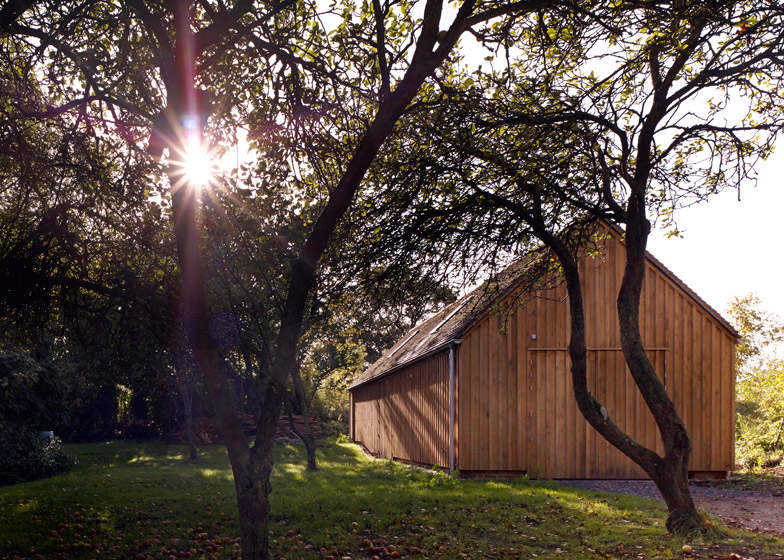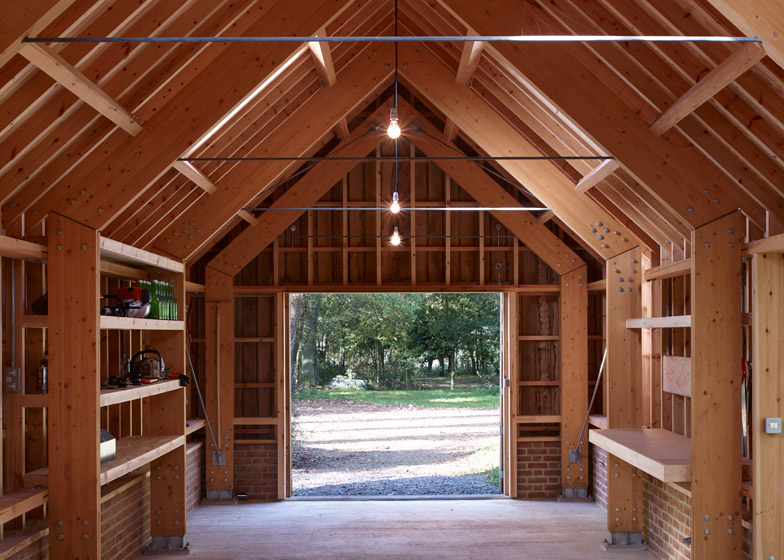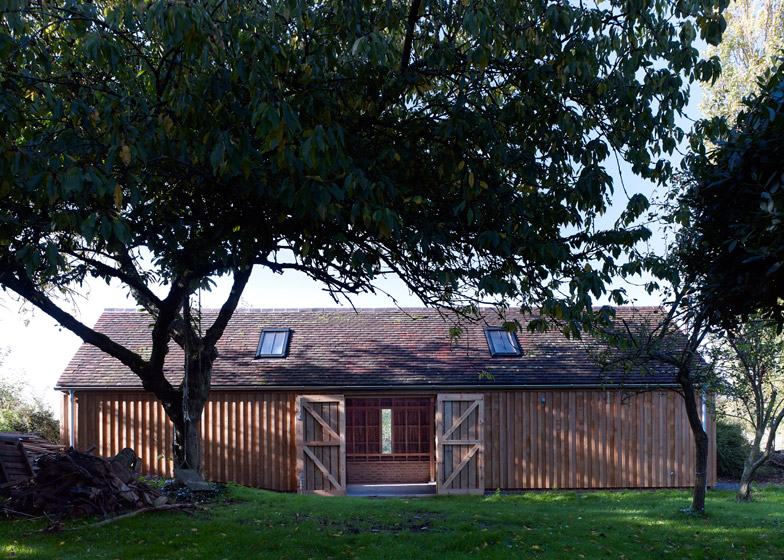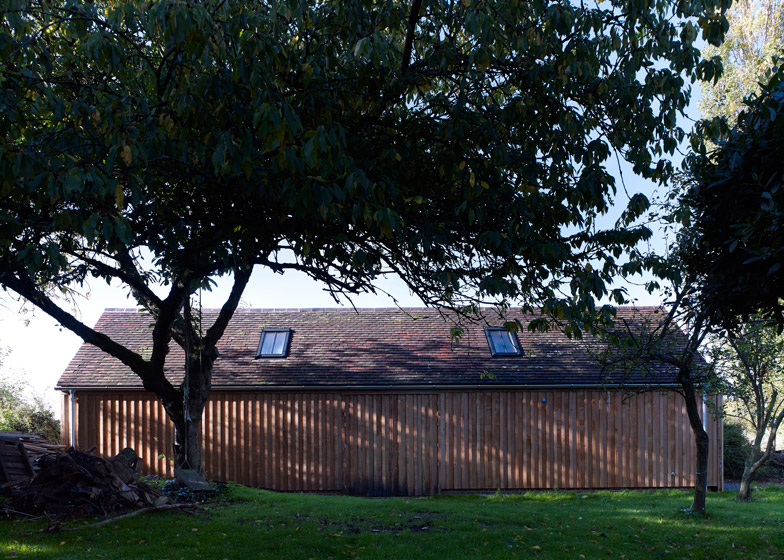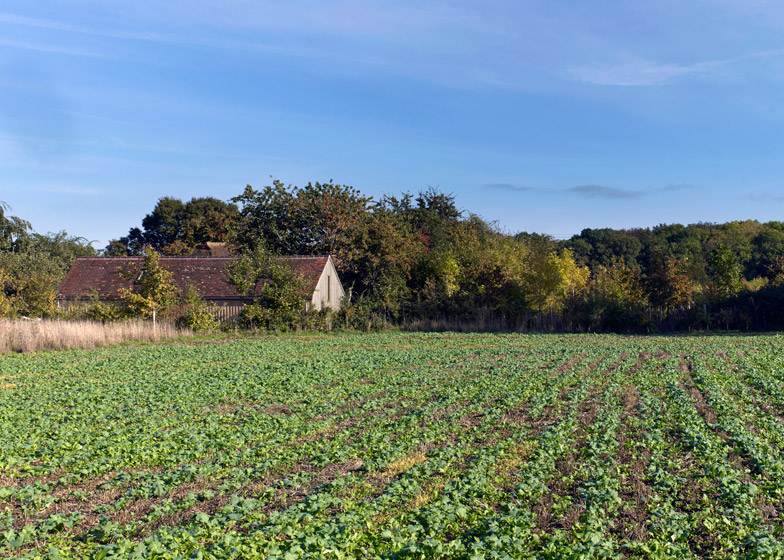British designer Tom Lloyd enlisted the help of London architect Cassion Castle to help him design and build a garden workshop in the grounds of his farmhouse cottage in Hampshire, England (+ slideshow).
Lloyd – one of the co-founders of design studio PearsonLloyd – wanted a garden retreat that he could use as a studio, garage or storeroom. His home is a traditional English cottage, so he was keen for its new partner to look well-crafted and lived in, but with a subtly modern aesthetic.
"Tom saw the opportunity to combine architecture and craftsmanship to create something beautiful yet simple," Cassion Castle told Dezeen.
"We wanted to wanted to avoid an obvious 'statement', and sought instead to produce something that, at first sight a least, would look as it if had always been there," he explained. "Up close, however, the contemporary detailing is more evident, and bringing contemporary design elements to an otherwise traditional form was very satisfying."
Named Long Sutton Studio, the single-storey barn was predominantly built from timber. It sits over a red brick base, to match the exterior of the original cottage, and the roof is covered with reclaimed tiles.
Green oak weatherboarding clads the exterior walls, which have been deliberately left unfinished, while six glued and laminated timber frames give the structure its gabled profile.
Castle explained how he and Lloyd experimented with both softwoods and hardwoods, planing them smooth in some areas while in others appear roughly sawn.
"We were clear from the outset that the building should be predominantly timber," said Castle. "We didn't feel limited at all by the relatively restricted palette – in fact Tom and I enjoyed playing with the variety that came with using different timber forms and finishes."
"We introduced galvanised steel plates and fixings to emphasise the structure, creating further visual interest and providing additional layers of contemporary detailing," he said.
Skylights puncture the roof, reducing the need for windows. Two pairs of oak-clad double doors were also added, allowing occupants to open the space out to the garden in good weather.
Shelving, worktops and storage areas have been built into the frame of the building and are complemented by simple details that include a log pile and a row of low-hanging light bulbs.
"It's a very honest and easy to understand building, and because every single element is exposed, there's nowhere to hide," said Castle. "Quality of design and materials were therefore critical, and we are very satisfied with the end result."
"From a distance it looks very simple and rather traditional, and as one moves closer to it and around it that character changes and its structural complexity and detailing become more evident," he added. "The end result is a real celebration of timber and craftsmanship."
Photography is by Kilian O'Sullivan.
Read on for the project description from the design team:
Long Sutton Studio by Cassion Castle Architects and Tom Lloyd
Cassion Castle Architects were commissioned to design this multi-purpose structure in the grounds of a former farmhouse in Hampshire. The client, product designer Tom Lloyd, wanted a timber building that could fulfill a series of basic functions as a studio, workshop, garage or storeroom. More importantly, he saw an opportunity to combine architecture and timber craftsmanship to create a simple yet beautiful building that would enhance its setting and complement his traditionally designed cottage. Tom commissioned Cassion Castle Architects in October 2011 and was closely involved in all aspects of the design.
Long Sutton Studio replaces a concrete garage and timber shed, both of which were in a poor state of repair. A key objective was to replace these with a single building that was more sympathetic to the main house, both in its design and choice of materials.
At first sight, Long Sutton Studio is deliberately understated. Its traditional form enables it to appear as though it has been there for many years, and to blend inconspicuously among nearby vernacular buildings. Closer inspection, however, reveals modern detailing which gives the studio a subtle and contemporary identity. The predominant material at Long Sutton Studio is timber, and here it is celebrated and showcased in its many forms: softwood and hardwood, laminated, planed and rough sawn.
Externally, the studio offers a simple and respectful presence alongside the main house. Traditional materials are used throughout: vertical unfinished green oak weatherboarding sits upon a red brick plinth (matching the bricks of the house) beneath a reclaimed tile roof. Natural light is admitted through roof lights set in the slope of the roof, allowing windows to be kept to a minimum along the main elevations so as not to interrupt the strong rhythm of the weatherboarding. Two fine sets of double doors - similarly clad in oak - open up the building on the primary elevations to admit further light when weather permits.
The interior provides a strong visual contrast with the simple exterior. Structural elements here are expressed decoratively, with fixtures and fittings used to give character to the space. The primary structure is a series of six glulam portal frames, with lesser elements then layered over this in a clear hierarchy. Exposed galvanised steel plates and fixings emphasise the structure and offer further visual interest alongside the timber and brick. Spaces created within the walls’ depth are employed as workspace, shelving and storage. Objects placed here, such as a log pile or piece of wooden furniture, can take on sculptural characteristics themselves and extend the celebratory use of timber.
Long Sutton Studio is completely accessible to all building users. Because it is illuminated almost entirely by natural light and has no heating, its carbon footprint is negligible.
Architect: Cassion Castle Architects
Client: Tom Lloyd
Main contractor: Cassion Castle Architects
Structural engineer: Structure Workshop
Timber frame: Kingston Craftsmen
Roofing: Fleet Roofing

